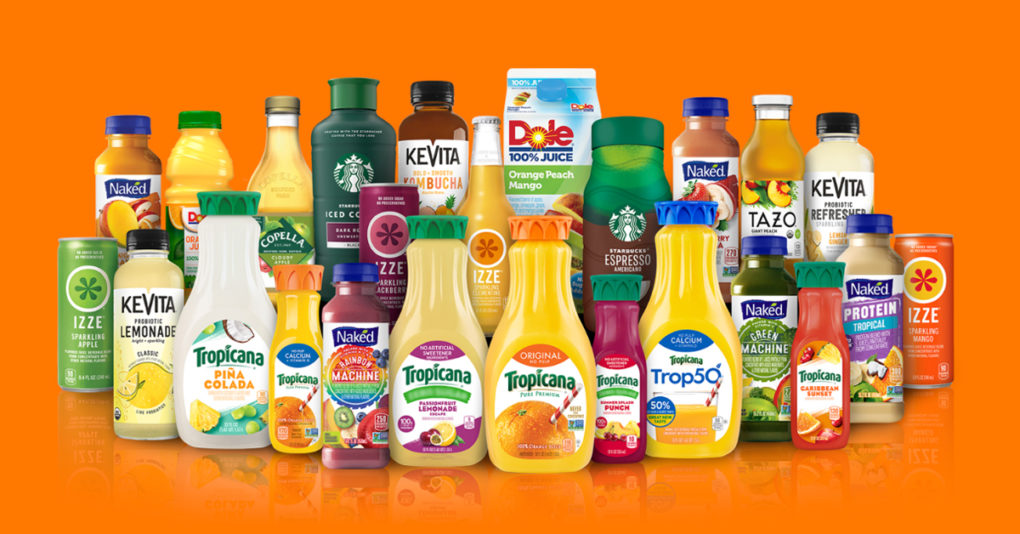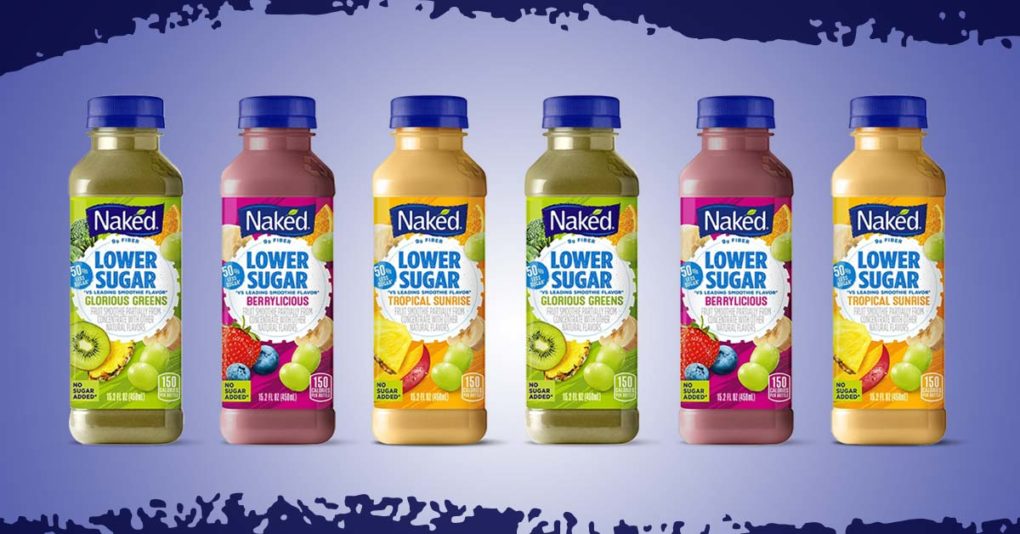Two years after PepsiCo divested its stake to private equity firm PAI Partners, the Tropicana Brands Group (TBG) has established a clear operational philosophy: act like a “$3 billion startup.”
That means making changes – reformulating smoothie brand Naked and refreshing the marketing for the core Tropicana line, specifically – as part of a “creative renaissance” aimed at reinvigorating TBG’s legacy brands as fresh, trendy and healthier beverages with Gen Z appeal.
“We have this opportunity as a carve out, as we stand up our own systems and processes, to rethink them and make them really fit for purposes outside of the prior context in which they existed,” Monica McGurk, TBG’s CEO of North America, told BevNET.
The new strategy can be seen in Naked, whose SKUs can contain as much as 55 grams of sugar and 320 calories per 15.2 oz. bottle. While the brand previously experimented with better-for-you options under PepsiCo’s ownership, including the past Half Naked line, under TBG the brand introduced a new Lower Sugar line in May, cutting the sugar by 50% and utilizing citrus fibers to maintain taste and texture. Available in Glorious Greens, Berrylicious and Tropical Sunrise flavors, the new smoothies contain just 150 calories per 15.2 oz. bottle and 24-26 grams of sugar.
Although it remains a leader in the smoothies space, Circana reported that dollar sales of Naked had fallen across its portfolio in U.S. MULO and c-store retail in the 52-weeks ending April 21, 2024. Naked’s refrigerated juice and smoothie drinks were down -10.4% to around $485.2 million in the period, though it’s worth noting that number two player in the segment, Bolthouse Farms, fared worse at -13.6% to around $199.4 million while the category overall was down -11.4%.
Many of Naked’s other product lines also declined in the period. Refrigerated blended fruit juices fell -31.1%, aseptic juices dropped -6.7% and products categorized as refrigerated “all other fruit juice” fell -15.3%.
Alongside the new line, TBG is aiming to shift away from the idea of smoothies solely as a breakfast or meal replacement product and instead reposition all of Naked’s products as a snacktime refreshment option. This Spring, the brand launched a new marketing campaign, “When Thungry, Get Naked,” playing on a portmanteau of “Thirsty” and “Hungry” to encourage consumers to reach for the brand as an anytime product. Naked has also recruited tennis star Coco Gauff as “Chief Smoothie Officer” to help reach younger consumers.
Since launching the Thungry campaign at the end of May, McGurk said the campaign – which includes video ads on streaming platforms Peacock, Roku, BET+ and Disney+, as well as a social and digital presence via Meta, YouTube and TikTok – has already shown strong metrics on “ad recall, mentions [and] positive sentiment” from consumers.
“It’s really cutting through and doing the job that we need it to do, to put the brand back in that relevant context for consumers and help them understand better how it fits into their lifestyles,” she said. “That’s the kind of creative renaissance that we really feel, being TBG, has enabled us to unlock; it’s one of the proof points of that.”
While Naked had struggled to drive sales growth in recent years, Tropicana’s performance, comparatively, has been more mixed. Its core refrigerated orange juice line grew 1% to over $977.3 million in the same period, refrigerated lemonade grew 68.7% to over $30 million, and refrigerated apple juice rose 14.7% to $37.3 million. However, the brand’s refrigerated “fruit drink” products were down -1.3% and shelf-stable orange juices declined -36.2%.
That data reflects only a segment of the company’s overall portfolio and does not cover all sales channels.
According to McGurk, the “creative renaissance” is also in full effect on Tropicana, with an emphasis on supporting the entire brand portfolio including, but also well beyond orange juice.
Tropicana’s blended Juice Drinks line, which includes flavors like Pineapple Mango, Peach Pineapple and Fruit Punch, has been rebranded as “Tropicana Refreshers.” As well, the brand is rolling out a new line of lemonades, available in Classic and Strawberry flavors in 46 oz. multiserve bottles.
The revamp is being supported by a number of new marketing efforts, including its “The Juice That Starts It All” campaign, launched in March, which is centered on Tropicana’s flagship orange juice portfolio, while the company plans to launch a new ad campaign next month dedicated to the Refreshers line. Other recent initiatives aim to build on that “$3 billion startup” mindset, McGurk said, such as partnerships with modern brands like Milk Bar – launching a limited time “Orange Squeeze” soft serve at its on-premise stores – and messaging across marketing channels is now aiming to appeal to younger Gen Z consumers.
Having products positioned at more affordable price points has also been an important pillar of the strategy, McGurk added, noting that the past two years of high inflation have tightened wallets requiring TBG’s brands to serve as a counter to premium price points in the grocery store.
Beyond modernizing its marketing, McGurk also said TBG is modernizing its backend by embracing A.I. technology and establishing a “data-forward, streamlined approach” to strategy with live dashboarding and “democratic access to data” for its team. The company is also exploring opportunities to use the Metaverse as both a place to virtually train staff and also “have virtual shelves,” she added.
However, McGurk said TBG is cautious in how it implements A.I., noting that any new technology it implements needs to have a clear purpose in supporting the business.
“All of those things, coupled with very purposeful, safe, governed implementation of advanced analytics and A.I. where it’s appropriate, is helping us cut through and be faster to respond to market signals,” she said.

